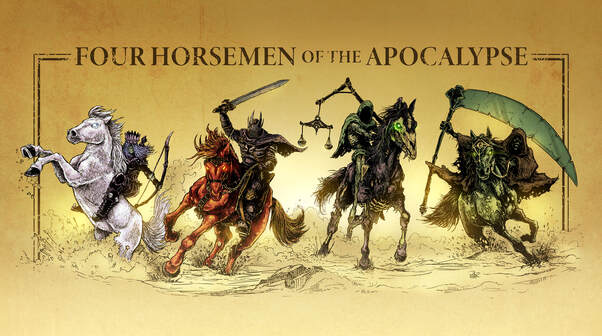Revelation 6:1-17
Lesson 476
Read both the "King James Bible" and the "New Living Translation."
In this lesson:
The wrath of God.
The four horsemen of the apocalypse.
This lesson begins "the seals of judgment"
segment, which runs through chapter twenty (lesson 496).
The first six seals of judgment are opened.
Coming up...
The seven trumpets of judgment (8:1-9:21).
The seven vials of judgment (16:1-21).
The wrath of God.
The four horsemen of the apocalypse.
This lesson begins "the seals of judgment"
segment, which runs through chapter twenty (lesson 496).
The first six seals of judgment are opened.
Coming up...
The seven trumpets of judgment (8:1-9:21).
The seven vials of judgment (16:1-21).
By graphic artist Daniel Pitner.
A reminder -
John's visions are not easy to interpret; even the most learned Bible scholars disagree over their meaning. These lessons are designed to help you interpret Revelation while allowing you to form your own conclusions.
There are numerous interpretations of Revelation. Many Christians believe that Revelation depicts the early years of the church (the persecution, the destruction of Jerusalem, etc.). They are convinced that Revelation's prophecies were fulfilled centuries ago with the wars, religious persecution, and social chaos that led up to and followed the fall of the Roman empire in AD 476. This is called the Preterist view. Other Christians (Futurists) believe that Revelation chapters 4-22 describe real people and predicts events yet to come in the final days before Christ returns. Although Futurists may differ among themselves over the precise interpretations of some passages, they take Revelation literally. Other Christians (Idealists) believe Revelation is simply a book about the triumph of good over evil and that the events described are merely symbolic and not prophecies at all. Still other Christians (Historicists) believe Revelation has a complex dual meaning pertaining both to the early years of the church (Preterist view) and coming events (Futurists view). They teach that Revelation is a history of Christianity from the early church until the day Christ returns. They believe the persecution of the first Christians and the fall of Rome was a foreshadowing of the future and that Revelation is a prediction of both past and future events.
John's visions are not easy to interpret; even the most learned Bible scholars disagree over their meaning. These lessons are designed to help you interpret Revelation while allowing you to form your own conclusions.
There are numerous interpretations of Revelation. Many Christians believe that Revelation depicts the early years of the church (the persecution, the destruction of Jerusalem, etc.). They are convinced that Revelation's prophecies were fulfilled centuries ago with the wars, religious persecution, and social chaos that led up to and followed the fall of the Roman empire in AD 476. This is called the Preterist view. Other Christians (Futurists) believe that Revelation chapters 4-22 describe real people and predicts events yet to come in the final days before Christ returns. Although Futurists may differ among themselves over the precise interpretations of some passages, they take Revelation literally. Other Christians (Idealists) believe Revelation is simply a book about the triumph of good over evil and that the events described are merely symbolic and not prophecies at all. Still other Christians (Historicists) believe Revelation has a complex dual meaning pertaining both to the early years of the church (Preterist view) and coming events (Futurists view). They teach that Revelation is a history of Christianity from the early church until the day Christ returns. They believe the persecution of the first Christians and the fall of Rome was a foreshadowing of the future and that Revelation is a prediction of both past and future events.
Study Tip:
Repetition is a writer's tool used to emphasize key points.
Whenever you see words or themes repeated in the Bible, it is a clue that God considers them important.
Hover over these passages a little longer to fully grasp their meaning.
Repetition is a writer's tool used to emphasize key points.
Whenever you see words or themes repeated in the Bible, it is a clue that God considers them important.
Hover over these passages a little longer to fully grasp their meaning.












